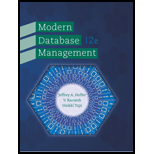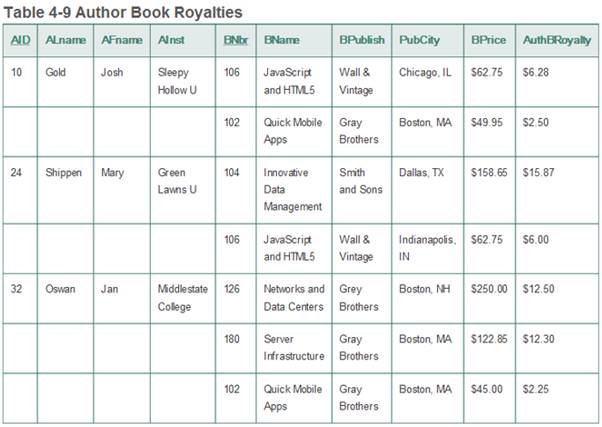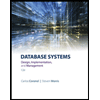
Concept explainers
Explore the data included in Table 4-9.

Assume that the primary key of this relation consists of two components: Author's ID (AID) and Book number (BNbr). The relation includes data regarding authors, books, and publishers. In addition, it tells what an individual author's per book royalty amount is in the case of multi-authored books. Your task is to:
- Identify the functional dependencies between the attributes.
- Identify the normal form in which the relation currently is.
- Identify the errors in the data that have been made possible by its poor structural characteristics.
- Take the actions (if any) necessary to convert the relation into the third normal form. Identify all intermediate steps.
Learn your wayIncludes step-by-step video

Chapter 4 Solutions
Modern Database Management (12th Edition)
Additional Engineering Textbook Solutions
Introduction To Programming Using Visual Basic (11th Edition)
Mechanics of Materials (10th Edition)
Java: An Introduction to Problem Solving and Programming (8th Edition)
Web Development and Design Foundations with HTML5 (8th Edition)
Electric Circuits. (11th Edition)
Starting Out with Java: From Control Structures through Data Structures (4th Edition) (What's New in Computer Science)
- 4. def modify_data(x, my_list): X = X + 1 my_list.append(x) print(f"Inside the function: x = {x}, my_list = {my_list}") num = 5 numbers = [1, 2, 3] modify_data(num, numbers) print(f"Outside the function: num = {num}, my_list = {numbers}") Classe Classe that lin Thus, A pro is ref inter Ever dict The The output: Inside the function:? Outside the function:?arrow_forwardpython Tasks 5 • Task 1: Building a Library Management system. Write a Book class and a function to filter books by publication year. • Task 2: Create a Person class with name and age attributes, and calculate the average age of a list of people Task 3: Building a Movie Collection system. Each movie has a title, a genre, and a rating. Write a function to filter movies based on a minimum rating. ⚫ Task 4: Find Young Animals. Create an Animal class with name, species, and age attributes, and track the animals' ages to know which ones are still young. • Task 5(homework): In a store's inventory system, you want to apply discounts to products and filter those with prices above a specified amount. 27/04/1446arrow_forwardOf the five primary components of an information system (hardware, software, data, people, process), which do you think is the most important to the success of a business organization? Part A - Define each primary component of the information system. Part B - Include your perspective on why your selection is most important. Part C - Provide an example from your personal experience to support your answer.arrow_forward
- Management Information Systemsarrow_forwardQ2/find the transfer function C/R for the system shown in the figure Re དarrow_forwardPlease original work select a topic related to architectures or infrastructures (Data Lakehouse Architecture). Discussing how you would implement your chosen topic in a data warehouse project Please cite in text references and add weblinksarrow_forward
- Please original work What topic would be related to architectures or infrastructures. How you would implement your chosen topic in a data warehouse project. Please cite in text references and add weblinksarrow_forwardWhat is cloud computing and why do we use it? Give one of your friends with your answer.arrow_forwardWhat are triggers and how do you invoke them on demand? Give one reference with your answer.arrow_forward
 Database Systems: Design, Implementation, & Manag...Computer ScienceISBN:9781305627482Author:Carlos Coronel, Steven MorrisPublisher:Cengage Learning
Database Systems: Design, Implementation, & Manag...Computer ScienceISBN:9781305627482Author:Carlos Coronel, Steven MorrisPublisher:Cengage Learning
